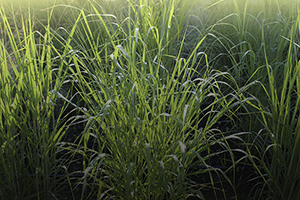De-Polluting Using Switchgrass

It’s been estimated that nearly 25 million acres of land used for firing ranges in the U.S. has been polluted with toxic chemicals from munitions. When they leach into groundwater, these chemicals can cause serious health problems including seizures and even some types of cancers.
Now biologists are looking at cleaning up these hazardous substances using genetically modified switchgrass, starting with an explosive known as RDX. The new grass variety contains two genes from a bacterium that reduces RDX into non-hazardous substances by producing enzymes to break it down. In experiments that compared areas planted with the modified switchgrass with those where only wild plants or no plants grew, water and soil samples showed significant reductions in RDX. In addition, although RDX appeared in the wild, unmodified plants, it did not appear in the tissues of the modified switchgrass, so it was not toxic to the new plants.
Further research will focus on transforming other species, including wheatgrass, to remove RDX from the environment, with the goal of maintaining biodiversity.
For information: Neil Bruce, University of York, Wentworth Way, York Y010 5DD United Kingdom; phone: +44-(0)1094-328500; email: neil.bruce@york.a.uk; Web site: https://www.york.ac.uk/ or https://www.york.ac.uk/biology/research/plant-biology/neil-c-bruce/